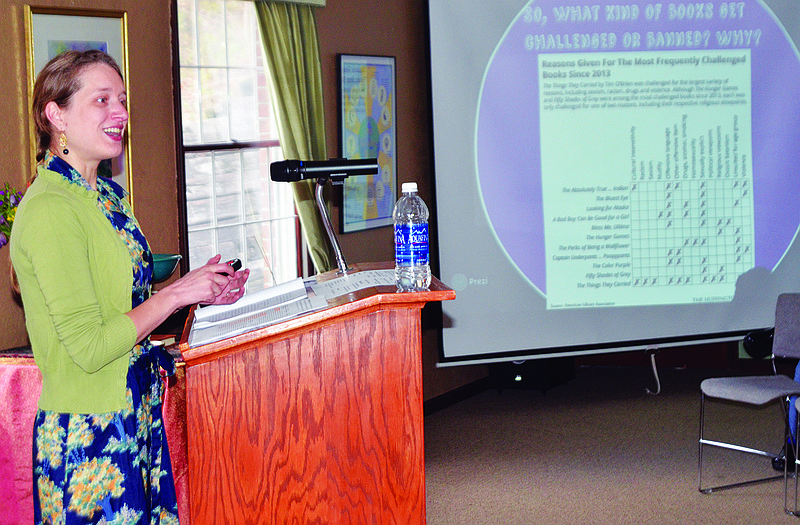More Missouri River Regional Library patrons attempt to ban DVDs than books these days, the library's teen services librarian told a group on Sunday.
Courtney Waters gave a presentation about banned books to about 30 people at the weekly service of the Unitarian Universalist Fellowship.
She said several people file "challenges" seeking book bans each year, but more try to ban certain DVDs. She doesn't know of any books that have been successfully banned at MRRL, but says a couple of DVDs have been pulled, including a parody called "How to Make Money Selling Drugs."
In 2013, there were 307 challenges reported nationwide to the American Library Association's Office of Intellectual Freedom, she said, adding that an estimated 80 percent of challenges go unreported.
"I'm very fortunate that I have not had to deal with very many challenges," Waters said. "I know that our person who orders DVDs on the other hand, has had to deal with quite a few."
After a formal challenge is made to a library, a library official will rule on the challenge. In a school, a teacher or administrator typically rules on such challenges. At that point, if the library or school official decides to keep the book, the challenger can appeal the decision to the next level. For the library, that's the board of directors.
"That's when things start to get very heated. That's when things start to make the news," she said. "And that's actually when it's time for the public to get involved. That's when it's time for the rest of us to stand up and say, "We are not going to tolerate a material that our librarian or teacher has put the time and effort into selecting for whatever circumstance, we don't want to see this banned.'"
Even after a ban, the public can get a book reinstated. And sometimes authors will donate their books to people in a community that has banned a book, she said. The Kurk Vonnegut Library donated copies of "Slaughterhouse-Five" when that book got banned in a community.
Most challenges come from parents, she said, for various reasons, including offensive language, violence, sex, racism and sexism.
Parents often decide what books their children can or cannot read, she said, adding: "My concern is when that parent decides that should be the case for all children, or all patrons in some cases."
Some of the most-challenged books of 2013 include "The Bluest Eye," "The Hunger Games," "The Absolutely True Diary of a Part-Time Indian," Fifty Shades of Grey" and "Captain Underpants."
One book that was banned, but later reinstated, from a Florida high school was a world history textbook. She said it was banned over concerns that it had a chapter on Muslim civilizations.
In response to a question from the audience, she said one type of book she would have a hard time defending are books that instruct in bomb-making, such as "The Anarchist Cookbook."

